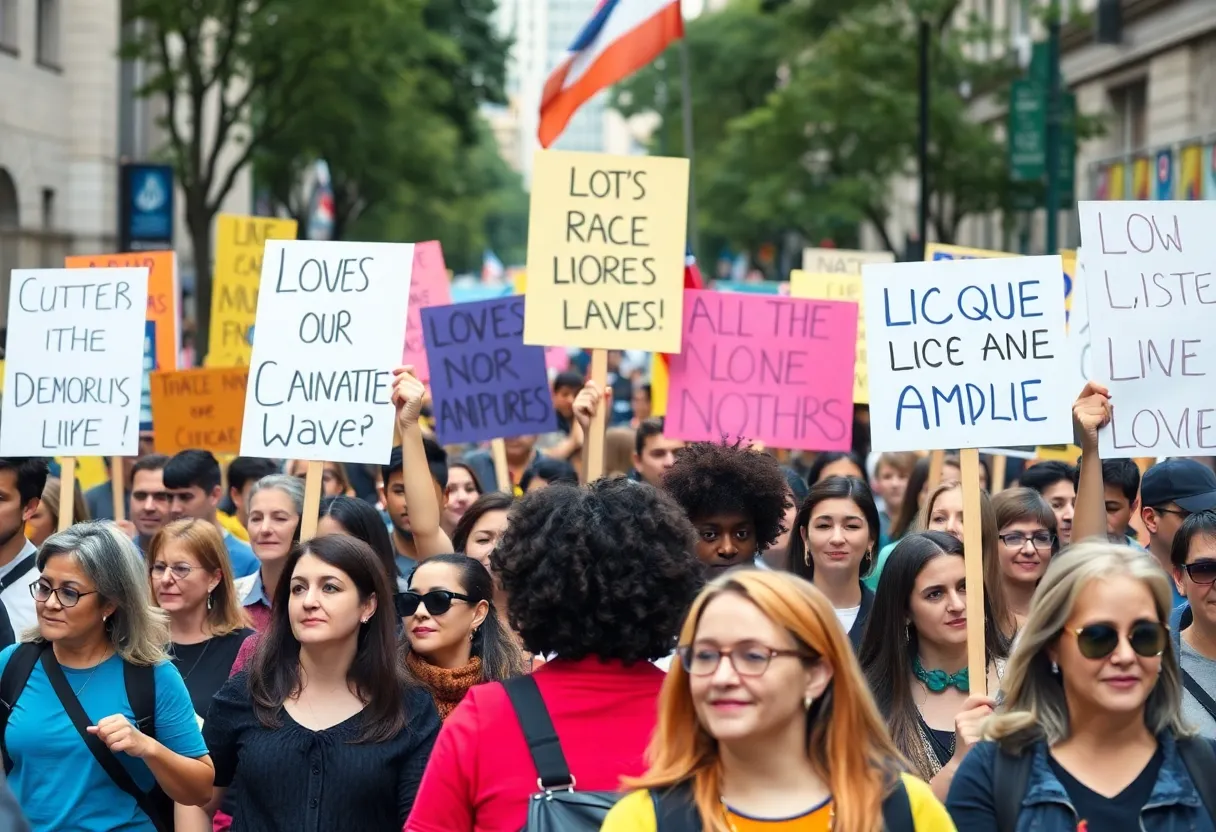News Summary
Thousands gathered in Kansas City this past Saturday for the ‘March for Democracy’, a demonstration against federal policies believed to threaten job security and democratic structures. The event featured passionate speeches and chants from diverse participants, reflecting widespread concerns about workforce cuts and executive power concentration. Protesters expressed their fears regarding the impact of these policies on education, healthcare, and free speech, highlighting a collective call for a more inclusive and equitable democracy.
Kansas City Hosts “March for Democracy” with Thousands of Voices Rising Against Federal Policies
This past Saturday, the heart of Kansas City became a vibrant sea of determination as thousands gathered for the highly publicized “March for Democracy.” Demonstrators lined the streets from Oak Street to Main Street, taking over 13th Street and creating a lively procession that wrapped around several blocks. The atmosphere was charged with passion, as participants marched over a mile, ultimately arriving at the National World War I Museum and Memorial.
The crowd painted a colorful picture of diverse backgrounds, each person united under a common cause. They carried signs that addressed pressing concerns, particularly those relating to federal government policies. With looming workforce cuts and drastic reductions initiated by the Department of Government Efficiency—an agency notably led by the billionaire entrepreneur Elon Musk—protesters voiced their anxieties regarding not just job security but also the fundamental structure of democracy itself.
Attendees like Susan Wyssmann found themselves emotionally affected by the cuts. Her daughter’s federally funded environmental grant program was impacted, leaving her horrified at what she perceived as a lack of due process for those affected. Many others echoed similar worries, expressing fears that these workforce reductions would lead to significant job losses across various sectors.
The energy in the streets was infectious, with chants like “This is what democracy looks like” ringing out, while others cried, “Hey hey, ho ho, Elon Musk has got to go.” Support came not only from within the crowd but also from passing vehicles, as cars honked their horns in encouragement, accompanying signs that read “honk for democracy.”
Among the marchers was Michaela Meckel, a mother who couldn’t help but reflect on the future her children might face. She spoke about the threats to free speech and voiced her concerns regarding the use of wartime laws for deportations driven by the previous administration’s policies. Other protesters, Kim and Roger VanMaren, shared their frustrations about the increasing concentration of executive power and what they perceived as a dismantling of essential democratic checks and balances.
Roger VanMaren, who once served as a school district superintendent, condemned executive actions that stripped away critical components of the education department, emphasizing the detrimental impact on marginalized children who are already facing challenges in the school system.
The importance of engagement from younger generations was a sentiment echoed by Linda Jurkiewicz. She criticized the current state of partisan politics and called for fresh leaders to rise and contribute meaningfully to the democratic process. In a similar vein, Chloe Fischer, a journalism student, highlighted the necessity of nurturing free speech and fostering empathy, especially in tumultuous times when rights seem to be under attack.
Healthcare was another topic of concern; local pediatrician Adriane looked on with apprehension for her patients, many of whom felt distressed about obtaining necessary pediatric care due to their backgrounds. Additionally, a special education teacher named Amy emphasized the challenging landscape created by the cuts to the U.S. Department of Education, asserting that support for affected children and families is now more crucial than ever.
The protest captured a spectrum of emotions, showcasing both hope and anxiety regarding the trajectory of the nation. Just as the atmosphere was one of solidarity and urgency, it also created space for reflection on what democracy means in contemporary America.
As the march came to a close, it coincided with a significant moment in the political calendar: President Donald Trump was nearing the 100-day mark into his second term on April 30. The assembled crowd seemed ready to assert that they were not willing to sit idly by, as they stood up for their vision of a more inclusive and equitable democracy.
Deeper Dive: News & Info About This Topic
HERE Resources
Jimmy Carter’s Lasting Impact on Africa’s Future
Additional Resources
- KCTV5: March for Democracy Protest
- Kansas City Star: Democracy March Coverage
- KSHB: March for Democracy in Kansas City
- Daily Gazette: Thousands Protest in KC
- Wikipedia: Democracy







